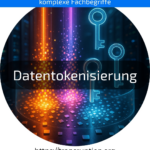Data tokenisation is a term used in the areas of big data and smart data, cybercrime and cybersecurity as well as blockchain.
Data tokenisation involves replacing real, sensitive data such as credit card numbers, national insurance numbers or personal information with randomly generated placeholders, so-called "tokens". These tokens look like real data but have no intrinsic value. The actual data is stored securely in a well-protected location and can only be recovered using special keys.
A simple example: an online shop no longer stores real credit card numbers. Instead, customers are given a token when they pay, for example "AF4T-93BX-1D78", which is used for payment. Even if hackers intercept this token, they cannot do anything with it as it is useless for other purposes.
Data tokenisation thus significantly increases data security and helps companies to comply with strict data protection guidelines. It is particularly important when a lot of personal data is processed, such as in the financial sector, in online shops or in the digital healthcare industry.






